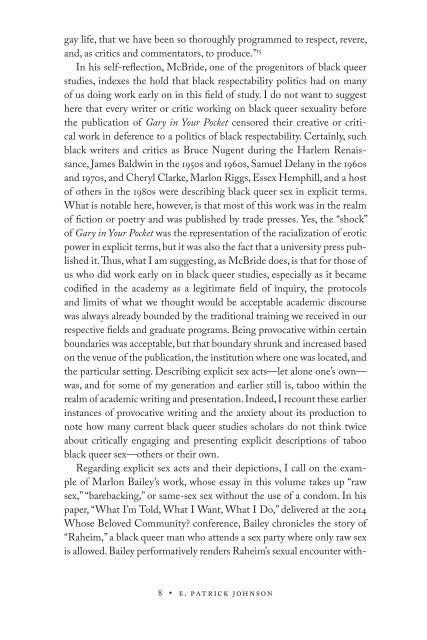No Tea
89AS6wvrf
89AS6wvrf
Create successful ePaper yourself
Turn your PDF publications into a flip-book with our unique Google optimized e-Paper software.
gay life, that we have been so thoroughly programmed to re spect, revere,<br />
and, as critics and commentators, to produce.” 15<br />
In his self- reflection, McBride, one of the progenitors of black queer<br />
studies, indexes the hold that black respectability politics had on many<br />
of us doing work early on in this field of study. I do not want to suggest<br />
here that every writer or critic working on black queer sexuality before<br />
the publication of Gary in Your Pocket censored their creative or critical<br />
work in deference to a politics of black respectability. Certainly, such<br />
black writers and critics as Bruce Nugent during the Harlem Re naissance,<br />
James Baldwin in the 1950s and 1960s, Samuel Delany in the 1960s<br />
and 1970s, and Cheryl Clarke, Marlon Riggs, Essex Hemphill, and a host<br />
of others in the 1980s were describing black queer sex in explicit terms.<br />
What is notable here, however, is that most of this work was in the realm<br />
of fiction or poetry and was published by trade presses. Yes, the “shock”<br />
of Gary in Your Pocket was the repre sen ta tion of the racialization of erotic<br />
power in explicit terms, but it was also the fact that a university press published<br />
it. Thus, what I am suggesting, as McBride does, is that for those of<br />
us who did work early on in black queer studies, especially as it became<br />
codified in the acad emy as a legitimate field of inquiry, the protocols<br />
and limits of what we thought would be acceptable academic discourse<br />
was always already bounded by the traditional training we received in our<br />
respective fields and gradu ate programs. Being provocative within certain<br />
bound aries was acceptable, but that boundary shrunk and increased based<br />
on the venue of the publication, the institution where one was located, and<br />
the par tic u lar setting. Describing explicit sex acts— let alone one’s own—<br />
was, and for some of my generation and earlier still is, taboo within the<br />
realm of academic writing and pre sen ta tion. Indeed, I recount these earlier<br />
instances of provocative writing and the anxiety about its production to<br />
note how many current black queer studies scholars do not think twice<br />
about critically engaging and presenting explicit descriptions of taboo<br />
black queer sex— others or their own.<br />
Regarding explicit sex acts and their depictions, I call on the example<br />
of Marlon Bailey’s work, whose essay in this volume takes up “raw<br />
sex,” “barebacking,” or same- sex sex without the use of a condom. In his<br />
paper, “What I’m Told, What I Want, What I Do,” delivered at the 2014<br />
Whose Beloved Community? conference, Bailey chronicles the story of<br />
“Raheim,” a black queer man who attends a sex party where only raw sex<br />
is allowed. Bailey performatively renders Raheim’s sexual encounter with-<br />
8 • E. Patrick Johnson


